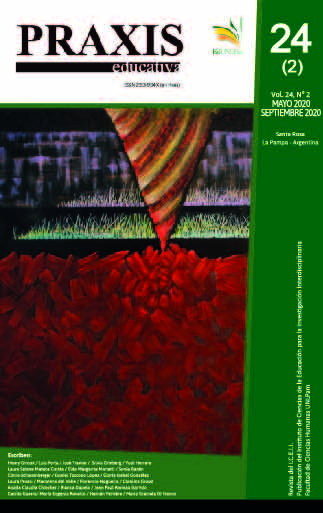Border concatenations: pedagogies, opportunities, sensitive worlds and COVID-19
DOI:
https://doi.org/10.19137/DOI:%20https://dx.doi.org/10.19137/praxiseducativa-2020-240203Keywords:
continuity-discontinuity, social solidarity, vital pedagogies, possible worlds, COVID-19.Abstract
The work tries to give an account of reflective exercises that have awakened the different interventions that are evident from the appearance of the pandemic and the conditions from which it is made -possible?- to look into the field of education and pedagogy as vital actions. Six reflections as questions are put forward to reconfigure borders and open new contemplations and possible actions: what remains and what changes; fears and how they can paralyze or draw new horizons, the possibility of thinking about this crisis to reignite social solidarity: the borders between normality and exceptionality; the condition of pedagogy in vital terms and as sensitive gestures and what saves us? Thinking about giving an opportunity to education and sustaining the option of vital pedagogies refer us to borders that we are encouraged to cross, as a way of accounting for that vital responsibility that we have as teachers of public institutions in times of “exceptionality”.
Downloads
References
Ahmed, S. (2019). La promesa de la felicidad. Una crítica cultural al imperativo de la alegría. Buenos Aires: Caja Negra.
Berardi, F. (2014). Después del futuro. Desde el futurismo al cyberpunk. El agotamiento de la modernidad. Madrid: Enclave.
Bodei, R. (2014). Imaginar otras vidas. Realidades, proyectos y deseos. Barcelona: Herder.
Butler, J. (2019). Cuerpos aliados y lucha política. Hacia una teoría performativa de la asamblea. Buenos Aires: Paidós.
Castells, M. (2020). Después de la guerra. Recuperado de:
https://www.lavanguardia.com/opinion/20200328/48119609179/despues-de-la-guerra.html. Fecha de consulta: 28 de marzo de 2020.
Coccia, E. (2011). La vida sensible. Buenos Aires: Marea.
Dewey, J. (2004). Democracia y Educación. Madrid: Morata.
Escolar, C. y Besse, J. (2011). Epistemología fronteriza. Buenos Aires: Eudeba.
Han, B. C. (2012). La sociedad del cansancio. Barcelona: Herder.
Handke, P. (2019). El peso del mundo. Buenos Aires: Adriana Hidalgo.
Haudricourt, A. (2019). El cultivo de los gestos. Entre plantas, animales y humanos. Buenos Aires: Cactus.
Illich, I. (2015). Obras reunidas I. México: FCE.
Innerarity, D. (2001). Ética de la hospitalidad. Barcelona: Quinteto.
Jonas, H. (2004). El principio de responsabilidad: ensayo de una ética para la civilización tecnológica. Barcelona: Herder.
Lévinas, E. (2000). Entre nosotros: ensayos para pensar en otro. Valencia: Editorial Pre-Textos.
Mbembe, A. (2011). Necropolítica. Barcelona: Melusina.
Merleau-Ponty, M. (2002). Fenomenología de la percepción. Madrid: Editora Nacional.
Mignolo, W. (2007). La idea de América Latina. La herida colonial y la opción decolonial. Barcelona: Gedisa.
Ordine, N. (2013). La utilidad de lo inútil. Barcelona: Acantilado.
Petit, M. (2016). Leer el mundo. Experiencias actuales de transmisión cultural. Buenos Aires: FCE.
Ramonet, I. (2016). Los nuevos miedos. Le Monde Diplomatique, 248, Nº 248.
Rancière, J. (1993). Los nombres de la historia. Una poética del saber. Buenos Aires: Nueva Visión.
Recalcati, M. (2016). La hora de clase. Por una erótica de la enseñanza. Barcelona: Anagrama.
Sassen, S. (2015). Expulsiones. Brutalidad y complejidad en la economía global (Trad. Mastrangelo, S.). Buenos Aires: Katz Editores.
Sedgwick, E. (2018). Tocar la fibra. Afecto, pedagogía, performatividad. Barcelona: Agpograf.
Segato, R. (2015). La crítica de la colonialidad en ocho ensayos y una antropología por demanda. Buenos Aires: Prometeo.
Sontag, S. (2004). Ante el dolor de los demás. Madrid: Santillana.
Stiegler, B. (2012). La quietud en movimiento. Una breve historia cultural de los viajes en y alrededor del cuarto. Buenos Aires: Paidos.
Downloads
Published
Issue
Section
License
Copyright Notice
Editorial Committee Educational Praxis Magazine:
I hereby declare that I am the author of the article titled (article name), that it is original and my own and that it was not previously published in any other format or medium. I declare to know that the magazine will not charge me any type of fee under any circumstances, nor will I receive any type of monetary compensation If it were accepted for publication in Educational Praxis, I authorize the aforementioned magazine to publish it digitally and to advertise it on its social networks.
If the work is published, I adhere to the Creative Commons license called "Attribution - Non-Commercial Share Alike CC BY-NC-SA", through which it is allowed to copy, reproduce, distribute, publicly communicate the work and generate derivative works, as long as when the original author is cited and acknowledged. This license has been used since September 2018. In 2016 CC BY NC ND 4.0 was adhered to; and in the years 2017 and 2018 (January-August) CC BY NC 4.0.
This CC BY-NC-SA Share Alike license does not, however, permit commercial use of the work. As an author, the journal may establish additional agreements for the non-exclusive distribution of the version of the work published in the journal, it allows me to self-archive the published articles, in their post-print version, in institutional, thematic repositories, personal web pages or any other relevant use. with the recognition of having been first published in this journal.
Educational Praxis adheres to DORA (Declaration on Research Assessment) signed in San Francisco, California, on December 16, 2012, and to the Declaration of Mexico (Joint Declaration LATINDEX - REDALYC - CLACSO - IBICT).















_(1)2.png)


3.png)











_(2).png)






2.jpg)









